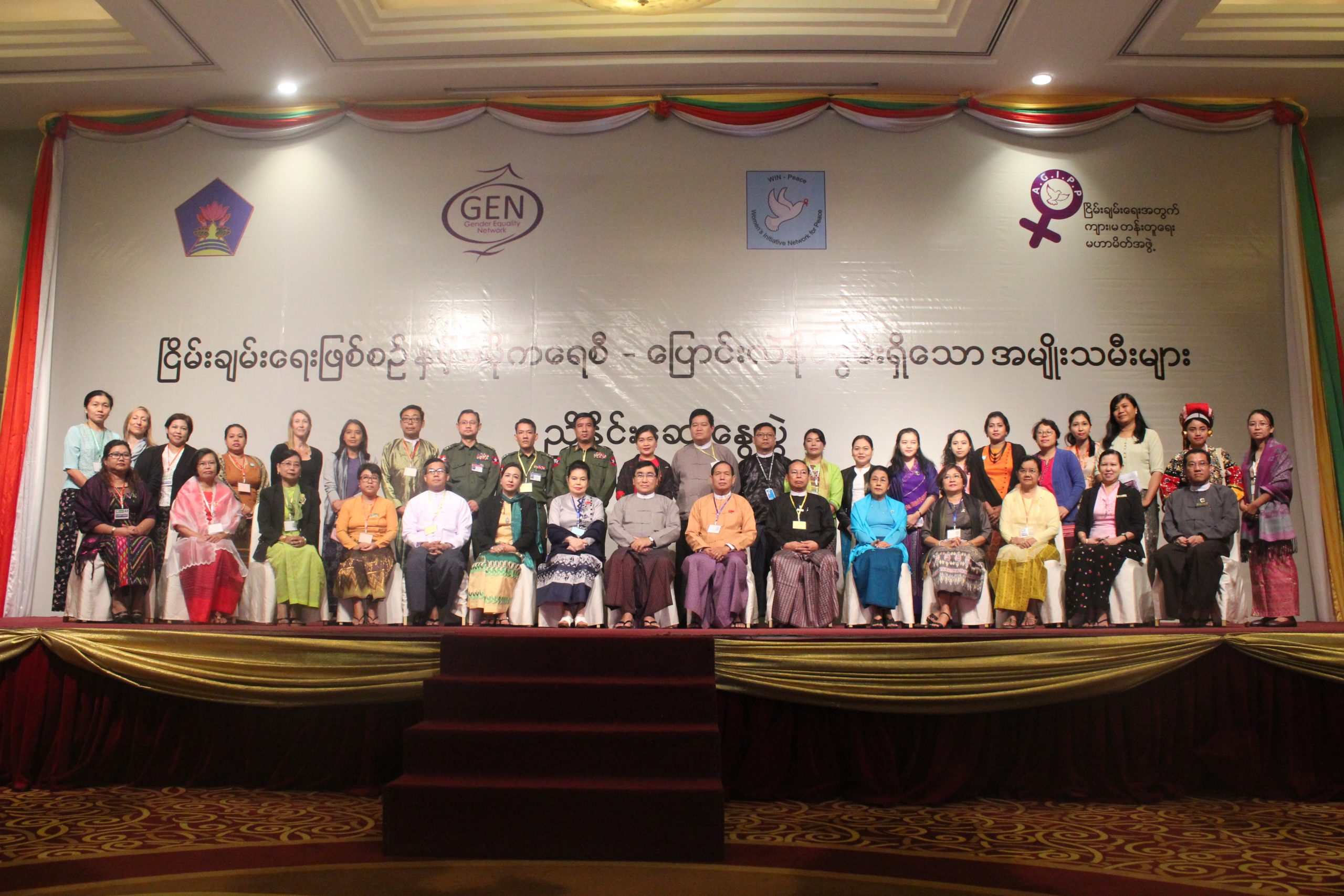Women’s rights groups are hopeful that the Ministry of Defence’s words of goodwill to include more women in peace talks at a conference on Friday will result in greater female representation at future dialogues.
About 200 people attended panel discussions in Naypyidaw last week involving women’s rights organisations, INGOs and members of the ministries of Social Welfare, Relief and Resettlement, and Defence, discussing the strengths and challenges of women’s participation in the peace process and democratic reform in Burma.
Nang Phyu Phyu Lin of the Alliance for Gender Inclusion in the Peace Process (AGIPP) told DVB the most notable commitment to come out of Friday’s meeting was from the Ministry of Defence, which “did make mention of committing to following international conventions and taking action when violence against women [VAW] cases occurs. He [Myo Win Aung, Ministry of Defence representative] also noted the need for more transparency within the military system.”
The event was organised by AGIPP in collaboration with the Gender Equality Network, Women’s Initiative Network for Peace (WIN-Peace) and the Ministry of Social Welfare, Relief and Resettlement, at the request of State Counsellor Aung San Suu Kyi.
Women’s organisations and human rights groups have documented cases of rape and sexual violence against women in conflict areas committed by the Burmese Army and submitted them to the committee charged with reviewing the government’s commitment to Convention on the Elimination of all Forms of Discrimination Against Women (CEDAW). However, no law protects women from violence except under the penal code and very few cases make it to court.
But Nang Phyu Phyu Lin said the talks were “highly successful” in her view. She is hopeful that the military is genuinely committed to preventing violence against women and punishing soldiers who commit these crimes.
“He [Myo Win Aung] requested that reporting on violence against women be proactively taken by the community and CSOs, and he repeatedly opened the door for collaboration with CSOs.”
Ensuring women have more seats at the table for peace talks was also an emphasis at the conference. Gender Equality Network (GEN) Director May Sabe Phyu and AGIPP’s Thandar Oo recommended that a 30 percent quota system be implemented for women to participate at all levels of peace talks. At the 21st Century Panglong Conference, an underwhelming representation of women comprising just over 13 percent and many other representatives from women’s rights organisations invited as “observers.”
Ph.D. candidate Jenny Hedström, who recently published a paper on gender, peace and security issues in Burma, emphasised that the 30 percent quota should be a minimum requirement, not a ceiling.
Hedström said “women and girls are systematically excluded from participating in both local and national level decision-making processes. This in turn exacerbates the insecurity that women and girls face by marginalising their voices and ability to call for redress, creating an environment of impunity.”
She points to the lack of a legal framework identifying, addressing, and preventing gender-based discrimination and violence in Burma, coupled with decades of entrenched militarisation that has effectively served to exclude women from decision-making positions.
“Experience from other countries shows that when women are brought on board, opportunities for sustainable and lasting peace improves,” Hedström said. “Women participate in conflict as both active soldiers and as tacit supporters, and it is important to bring these women on-board as supporters, rather than as spoilers, for peace.”
During a second panel discussion focused on prevention and planning for VAW survivors in conflict zones, a number of panellists representing a range of interests including civil society organisations to the United Nations emphasised the need for legal aid and psycho-social support for victims.
[related]
The lived experiences of women as internally displaced persons (IDPs), their needs and safety concerns were also raised by rights campaigners. “Civilians in IDP camps want peace,” Nang Phyu Phyu stated simply, before explaining that women continue to be seen as only victims.
Their voices should be heard, she said, to reverse this cycle of violence: “They want to be able to return to their homes in safety, security and health, and panelists said that without sustainable peace, women will continue to suffer.”
According to a report from the UN Office for the Coordination of Humanitarian Affairs, women and children make up about 80 percent of the country’s 218,000 IDPs.
The 21st Century Panglong Conference is due to reconvene in February, with women’s groups looking to the event as a barometer for whether their emphasis on female inclusion has borne fruit.



